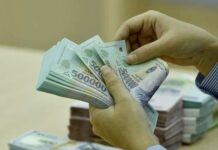The delegation included Deputy Prime Minister Ho Duc Phoc, Vice Chairman of the National Assembly Vu Hong Thanh, Minister of Construction Tran Hong Minh, Acting Minister of Agriculture and Environment Tran Duc Thang, Senior Lieutenant General Hoang Xuan Chien – Deputy Minister of Defense, Senior Lieutenant General Nguyen Van Long – Deputy Minister of Public Security, and Permanent Deputy Minister of Foreign Affairs Nguyen Minh Vu, along with representatives from various central ministries and departments and Vietnamese Ambassador to China Pham Thanh Binh.
This year’s conference took place in Tianjin, with the attendance of over 20 heads of state and high-ranking leaders, including Chinese President Xi Jinping, Russian President Vladimir Putin, and Indian Prime Minister Narendra Modi. In addition to the 10 official members, the event also included observer countries, dialogue partners, international guests, and leaders of numerous regional and global organizations.
Vietnam was invited as a guest of China. This, according to assessments, demonstrates the SCO countries’ respect for Vietnam’s role and voice in security, political, and development issues. It was also an opportunity for Vietnam to express its views and promote multilateralism and cooperative dialogue to maintain regional stability and sustainable development.
During the visit, Prime Minister Pham Minh Chinh is expected to meet with high-ranking Chinese leaders and work with ministries, departments, and businesses to strengthen the Comprehensive Strategic Cooperative Partnership and build a Vietnam-China Community with a Shared Future. The focus will be on promoting economic, trade, and investment cooperation and implementing strategic infrastructure projects.

Prime Minister Pham Minh Chinh’s invitation to the SCO summit as a guest of the host country demonstrates the SCO countries’ respect for Vietnam’s role and standing and their desire to hear Vietnam’s perspectives on regional and global security, political, and development issues – Photo: VGP/Nhat Bac
|
– 07:30 31/08/2025
Q2: Oil Giants Soar, Upstream Group Shines Brightly
The oil and gas industry witnessed a notable divergence in the second quarter of 2025. The industry giants soared to new heights, while the remaining players experienced a boom in upstream ventures.
Supplementing VEC’s Charter Capital: What Did Deputy Prime Minister Ho Duc Phoc Have to Say?
On the afternoon of December 10th, at the Government Headquarters, Deputy Prime Minister Ho Duc Phoc had a working session with the Vietnam Expressway Corporation (VEC), the State Capital Management Committee, and relevant ministries and sectors. The discussion focused on two key agenda items: exploring options to supplement VEC’s chartered capital and determining the timeline for repaying the principal and interest of VEC’s government-guaranteed bonds.
“A Lean, Mean Machine”: Vice Prime Minister Ho Duc Phoc on Vietnam’s Path to Efficiency and Effectiveness
The consolidation of the Ministry of Information and Communications and the Ministry of Science and Technology is a strategic move to optimize resources and synchronize policies. This merger aims to drive the development of science, technology, innovation, and digital transformation while enhancing service quality for citizens and businesses.
The Ultimate Guide to Captivating Copywriting: Unleashing the Power of Words
Mr. Nguyen Hoang Anh, Chairman of the State Capital Management Committee, expressed the Committee’s agreement with the proposal to restructure and streamline the apparatus. He also conveyed the Committee’s hope that the Government would facilitate job placement for the affected officers and staff.













































